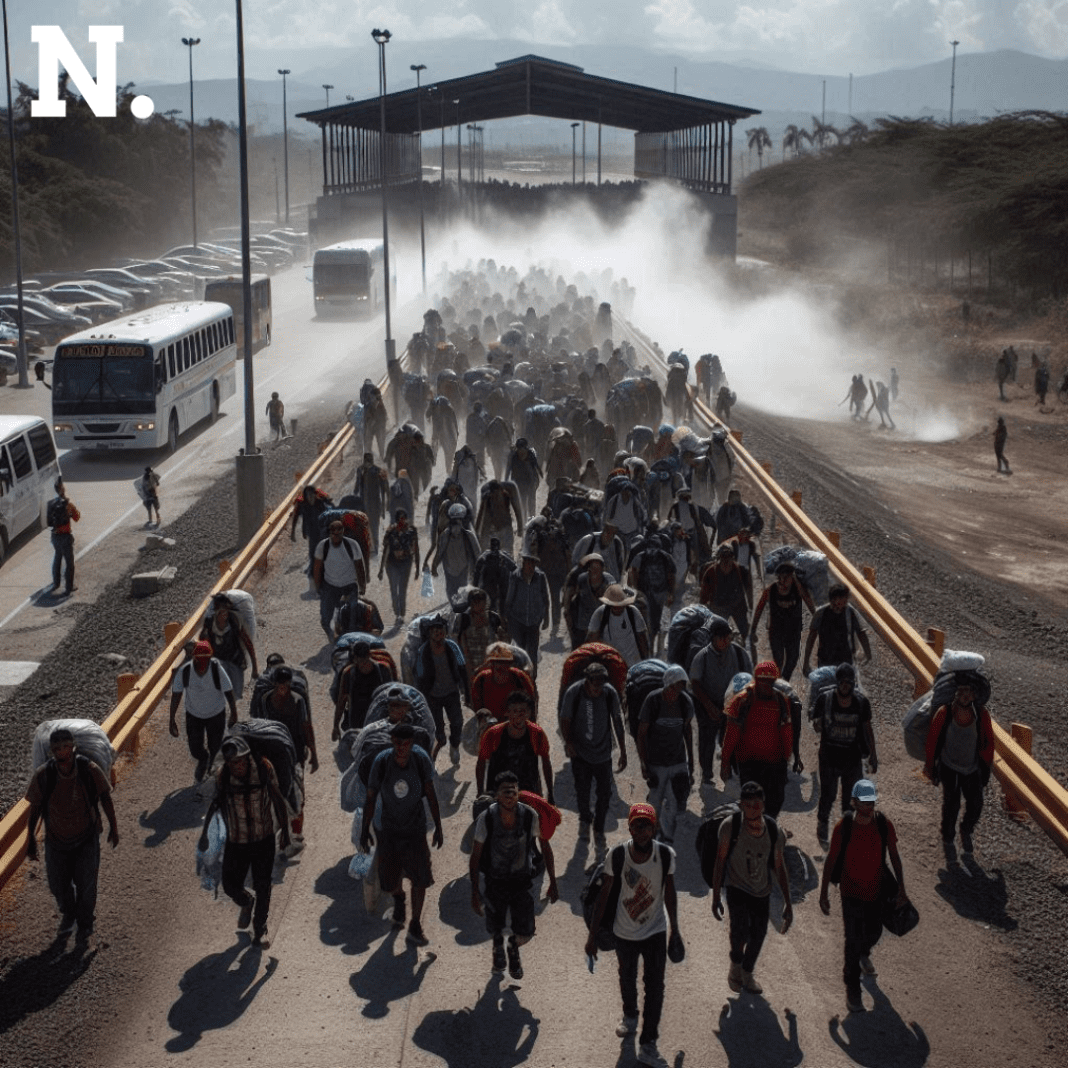The tightening of asylum policies by the Biden administration has engendered—amid scorching heat in Ciudad Juarez, a city facing El Paso, Texas—a wave of deportations and desperate migrant journeys, marking a dark turn in U.S. immigration strategy.
Recent scenes at the international bridge between El Paso and Ciudad Juarez encapsulate the human toll. And strategic shifts under President Joe Biden’s immigration policies. On Saturday, a group of Venezuelan migrants—mostly young men—walked into Mexico minutes after being deported from the United States. Their plight underscored the hard realities of Biden’s June 5 asylum ban. Allowing for fast-track deportations for most people who enter the United States illegally.
Those deportees, many visibly exhausted and carrying stories of perilous desert crossings. Passed by another group of migrants who came equipped with wheelie suitcases. These waiting patiently for their turn for interviews on CBP One, a mobile phone application endorsed by the administration as the sole legal pathway to approach the ports of entry of the United States.
Asylum Restrictions Impact Crossings
“For now, Biden’s restrictive asylum policy, combined with tougher immigration. Enforcement by Mexico, appears to be lowering crossings,” said a senior U.S. Customs and Border Protection official. Speaking on condition of anonymity because the figures are preliminary and the subject of negotiations with Mexico. Apprehensions have fallen sharply, hitting their lowest daily total since February 2021.
According to Juan Fierro Garcia, the director of Buen Samaritano migrant shelter, the number of migrants. That have come to his facility for refuge increased nearly 40 percent. Since Biden’s order brought back Trump-era restrictions. “The border’s practically closed, so the only legal way in is through CBP One,” said Fierro Garcia, outlining the limited options left for migrants seeking lawful entry.
For many, like 46-year-old Honduran Fidelina Bardales and her two daughters, 15 and 5, the CBP One app is a last resort after months of uncertainty and danger. Bardales began a nine-month journey through treacherous terrain. After the tragic murder of her son, in hopes of finding refuge under U.S. asylum protections that would take her remaining family members out of harm’s way.
Not all journeys have ended in hope, however. Harsh conditions imposed by Biden’s policies have increased the risks, elevating the toll of tragic deaths along the border. Mexican authorities just recovered the body of Adriana Castellanos, 23, who probably died due to dehydration near Ciudad Juarez—a sobering reminder that lethal consequences are rooted in border policy.
Yenny Cisneros: Success Amid Asylum Process
Activist Alan Lizarraga of the Border Network for Human Rights. Condemned the ever-growing death toll among migrants and blamed the deaths. On the hard-lined measures taken by both the United States and Mexico, stating, “Migrants are being killed by the policies.” Desperation pushes migrants into treacherous desert crossings.
Amidst all that chaos, the successes on the U.S. side provided a glimmer of light at the end of the tunnel—the story of Venezuelan Yenny Cisneros, 36. She had waited patiently for her immigration court hearing after having made it through the CBP One process. with much gratitude and apprehension, now hoping to get a work permit. So she could start her life over again in Houston.
Challenges remain, however. Border Patrol agents, seeing a spike in deaths from early heatwaves and increased migrant vulnerability, expressed concern over the humanitarian consequences of current policy. “Migrants have become the victims of cruel treatment at the hands of criminal groups,” said Orlando Marrero Rubio, a U.S. Border Patrol agent, adding that they were being exposed to harsh environmental elements as well.
Alejandro Wilchez: Victim of Border Force
Facing mounting criticism and increasing humanitarian crises, Alejandro Mayorkas, the US Secretary of Homeland Security. Tried to put a defense on behalf of the administration by claiming that many of the migrants are motivated by economic reasons. Rather than out of fear of persecution. It was his assumption that the tough rules laid out by Joe Biden. Would continue setting the trend for migration despite the increasing toll.
Meanwhile, migrant families, such as Alejandro Wilchez’s, have borne the brunt of these policies firsthand. Wilchez, 24, described a harrowing encounter with Texas National Guard soldiers who deployed pepper balls. Against his family while they were approaching the border fence; the projectiles hit his wife and baby daughter. Now waiting for his CBP One appointment, Wilchez voiced fears for his family’s safety and future.
As the Biden administration seeks to steer immigration policy through a minefield of humanitarian interests and strict enforcement measures. The borderlands between Ciudad Juarez and El Paso become part of a vast human drama. Wherein every step towards safety for the migrant is treacherous and reflects a broader debate: what America’s responsibilities are to be a sanctuary, and what they are in relation to the global migration crisis.
In Ciudad Juarez, where hope meets hardship, the implications of Biden’s asylum policies persist, forging destinies for thousands of families in search of refuge.





